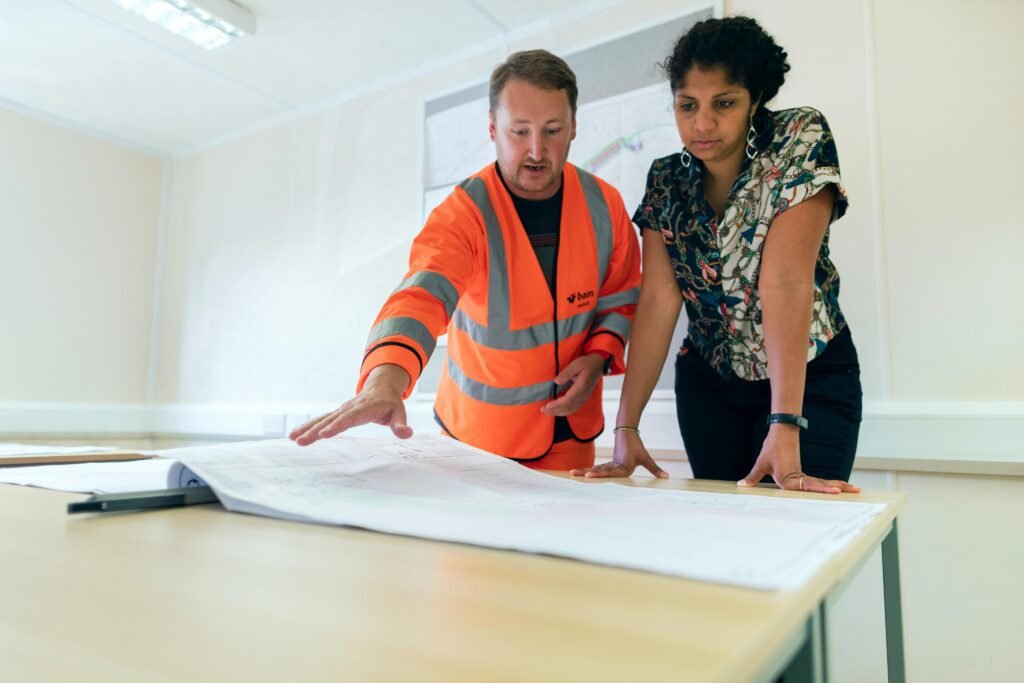The construction sector is a cornerstone of New Zealand’s economy, characterized by robust growth, substantial employment opportunities, and a significant contribution to the nation’s GDP. Here’s a detailed overview of its impact and projections:
- Economic and Employment Overview:
- Ranked as the fifth-largest sector in New Zealand’s economy.
- Employs over a quarter of a million people directly, with a total construction value reaching $43.2 billion in 2019.
- Additional 200,000 jobs supported in ‘construction-related’ occupations.
- Residential building emerged as the largest contributor, accounting for 55% of construction activity in 2019.
- The GDP contribution from the construction industry surpassed 18.6 billion New Zealand dollars in the year ended September 2022.
- Employment figures in Q4 2022 showed more than 182,000 people working in the sector, marking a significant increase over the decade.
- Geographical Employment Distribution:
- Majority of construction jobs are located in New Zealand’s most populous areas: Auckland, Waikato (Hamilton), Bay of Plenty (Tauranga-Rotorua), Wellington, Christchurch, and Napier-Hastings.
- Growth Projections:
- Expected regional growth up to 2023 includes:
- Auckland: 26%
- Waikato/Bay of Plenty: 22%
- Wellington: 25%
- Rest of New Zealand: 10%
- Canterbury is the exception, with a projected decline in opportunities as the rebuild phase winds down.
- Expected regional growth up to 2023 includes:
- Sector Contributions:
- In 2017, the breakdown of total construction value was as follows:
- Residential building: 59%
- Non-residential building: 22%
- Infrastructure: 19%
- Residential dwelling consents are anticipated to exceed historic highs, aiming for 43,000 by 2023.
- In 2017, the breakdown of total construction value was as follows:
This data underscores the construction industry’s vital role in fostering economic development and employment across New Zealand. With growth expected in various regions and a significant focus on residential construction, the sector presents promising opportunities for professionals and students aiming to build their careers in construction.
Section 1: Construction Courses in New Zealand

New Zealand is home to a variety of educational institutions that offer comprehensive construction courses designed to meet the needs of the industry. These include universities, polytechnics (also known as Institutes of Technology or Polytechnics (ITPs)), and private training establishments (PTEs). Each type of institution provides a unique approach to education, with a focus on blending theoretical knowledge with practical skills.
Universities in New Zealand offer bachelor’s, master’s, and doctoral degrees in construction-related fields, such as civil engineering, construction management, and architectural studies. These programs are research-driven and provide a solid foundation in both the theoretical aspects and practical applications of construction.
Polytechnics or ITPs are known for their practical, hands-on approach to learning. They offer a range of programs including certificates, diplomas, and bachelor’s degrees in construction, quantity surveying, building science, and more. These courses are designed to equip students with the skills needed to enter the workforce directly.
Private Training Establishments (PTEs) focus on specific vocational training and often offer shorter, more flexible courses tailored to specific needs of the construction industry. These might include specialized certificates and diplomas in construction management, carpentry, and project management.
Types of Courses Available
- Certificates and Diplomas: These are entry-level qualifications that provide fundamental skills and knowledge in construction. Courses may cover basic construction techniques, health and safety regulations, and introductory project management. They are suitable for those looking to enter the field or gain specific skills.
- Bachelor’s Degrees: These undergraduate programs offer comprehensive education in construction disciplines. Subjects might include construction management, civil engineering, and architecture. They blend theoretical studies with project work and internships to prepare graduates for professional roles.
- Postgraduate Studies: Master’s and doctoral programs are available for those seeking advanced knowledge or to specialize in areas such as sustainable construction, advanced construction management, or structural engineering. These are research-oriented and often require a thesis or dissertation.
Highlight Specific Programs and Their Objectives
- Bachelor of Construction (Construction Management): This program aims to equip students with the managerial skills and technical knowledge required to lead construction projects. It covers project management, construction law, economics, and sustainable building practices.
- Diploma in Quantity Surveying: Focuses on cost management and budgeting in construction projects. Graduates learn to estimate costs, manage contracts, and ensure projects are completed within budget.
- Master of Architectural Engineering: Combines architectural design with engineering principles. It aims to produce graduates who can design efficient, sustainable, and aesthetically pleasing buildings.
Entry Requirements and Application Process
Entry requirements vary by program and institution. Generally, for undergraduate courses, applicants need to have completed secondary education with good grades in mathematics and sciences. For postgraduate studies, a relevant undergraduate degree is typically required.
The application process usually involves submitting academic transcripts, proof of English proficiency (for non-native speakers), letters of recommendation, and a personal statement. Some programs may also require portfolios or interviews.
Featured Courses from ICL Partner Institutions
- Diploma in Construction (Construction Management) – Level 6: Ara Institute of Canterbury
- Diploma in Construction (Quantity Surveying) – Level 6: Southern Institute of Technology, Unitec Institute of Technology, Wintec, Whitireia New Zealand
- New Zealand Certificate in Horticulture (Level 3) Landscape Construction Strand: Southern Institute of Technology
- New Zealand Certificate in Construction Trade Skills (Carpentry) Level 3: Universal College of Learning (UCOL)
- Bachelor of Construction (Level 7): Southern Institute of Technology
- Graduate Diploma in Construction (Level 7): Southern Institute of Technology
- Bachelor of Construction (Property Development): Unitec Institute of Technology
These programs are designed to equip students with the necessary skills and knowledge to excel in the construction industry, addressing the sector’s growing demand for qualified professionals.
We have partnered with 20+ Institutes, for more information or if interested in construction courses in New Zealand, please contact ICL Immigration Service at application@immigrationconsultancies.com.
Section 2: Career Opportunities in the Construction Industry in New Zealand – Data-Enriched Insights

The construction industry in New Zealand presents a wealth of career opportunities, underscored by ongoing skill shortages, promising job market trends, and the emergence of new roles and specializations. Here’s a closer look at the current landscape:
Ongoing Skill Shortages
- A significant challenge within the industry is the difficulty employers face in recruiting for specific skills. According to a major international recruiting agency:
- Senior Managers: 69% of employers find it very difficult or hard to recruit.
- Project Managers and Construction Managers: Both at 66% difficulty.
- Estimators: 56% difficulty in recruiting.
- Quantity Surveyors: 55% face challenges in hiring.
- Site Managers: 52% difficulty in recruitment.
- Project Engineers: 50% report challenges in finding skilled candidates.
Job Market and Employment Trends
- Growth Projections: The sector is expected to see a 4% annual growth rate over the next five years, fueled by large-scale infrastructure projects and housing developments.
- Skill Shortages: New Zealand is experiencing a shortage of over 30,000 workers in the construction sector, highlighting a demand for skilled project managers, quantity surveyors, and civil engineers.
- Salary Insights:
- Construction project managers have a median salary of around NZD 100,000 per year.
- Experienced civil engineers can earn between NZD 80,000 to NZD 120,000.
- Quantity surveyors and site managers have median salaries between NZD 75,000 to NZD 95,000.
Emerging Roles and Specializations
- Sustainability in Construction: The focus on reducing carbon emissions has spiked demand for sustainability consultants, offering salaries between NZD 70,000 to NZD 120,000.
- Technology Integration: Over 60% of construction firms now employ Building Information Modelling (BIM) technologies, creating opportunities for BIM specialists and technology experts with starting salaries around NZD 65,000, potentially rising to NZD 100,000.
Real-life Success Stories or Case Studies
- Auckland City Rail Link: This project has not only provided numerous employment opportunities but also showcased the importance of sustainable urban development.
- Canterbury Rebuild: Post-2011 earthquakes, the rebuild created over 15,000 jobs and highlighted the industry’s innovation and resilience.
Importance of Hands-on Experience
- Statistical Advantage: Candidates with practical experience are 35% more likely to be hired compared to those with only theoretical knowledge.
Internships and Apprenticeships
- Participation Rates: Over 4,000 students and graduates have engaged in construction-related internships and apprenticeships, with 80% reporting significantly improved job prospects.
Section 3: Licensing and Registration in New Zealand’s Construction Industry

Depending on your occupation, you may be required to register with a professional body in order to get a job and visa. In any case, getting a visa may be more straightforward if you are able to obtain professional registration in New Zealand.
Professional licensing and registration are pivotal in New Zealand’s construction industry, setting benchmarks for quality and competence. These credentials ensure professionals adhere to the high standards required for safe and effective operation. Among the most notable credentials are the Licensed Building Practitioner (LBP) and Chartered Professional Engineer (CPEng) statuses.
Professional Registrations Overview
Professionals in various fields within the construction industry are required to obtain specific registrations, governed by distinct authorities. Below is a summary of these professions and their regulatory bodies:
Profession | Registration Authority | Postal Address |
Architect | New Zealand Registered Architects Board (NZRAB) | – |
Cadastral (Land Title) Surveyor | Survey and Spatial New Zealand | – |
Electrical Service Technician | Electrical Workers Licensing Group | – |
Electrical Engineer | Electrical Workers Licensing Group | – |
Electrician | Electrical Workers Licensing Group | – |
Plumber, Gasfitter, and Drainlayer | Plumbers, Gasfitters & Drainlayers Board | PO Box 10 655, Wellington 6143 |
Line Mechanic | Electrical Workers Licensing Group | PO Box 10 156, Wellington |
Detailed Look at Key Credentials
Licensed Building Practitioner (LBP)
Requirements:
Experience: Applicants must demonstrate relevant practical experience in their field.
Competence Assessment: Submission of detailed evidence of work experience, competency references, and, if required, undergoing an assessment interview or examination.
Educational Qualifications: Relevant qualifications can bolster an application, depending on the license category.
Process:
Application Submission: Candidates submit an application with evidence of qualifications and experience.
Assessment: The Building Practitioners Board reviews applications, which may include evidence assessment, interviews, or practical tests.
Approval and Registration: Successful applicants are registered as LBPs, with a requirement to renew their license every two years.
Benefits:
Legal Requirement: Essential for undertaking certain critical building works in New Zealand.
Professional Recognition: Achieving LBP status enhances one’s reputation and job prospects in the building industry.
Continued Professional Development: The LBP scheme encourages ongoing learning and upskilling, ensuring adherence to industry standards and regulations.
Chartered Professional Engineer (CPEng)
Requirements:
Educational Background: A degree accredited by the Washington Accord or equivalent is typically required.
Professional Experience: A minimum of five years of relevant engineering experience is needed, highlighting technical competence and professional judgment.
Competence Demonstration: Preparation of a detailed report on engineering projects and experiences, followed by an interview with Engineering New Zealand assessors.
Process:
Initial Assessment: Submission of an application along with evidence of qualifications and professional experience.
Professional Assessment: Provision of detailed work experience documentation and undergoing an interview.
Chartered Status: Successful candidates are awarded Chartered Status, recognizing their professional competence.
Benefits:
Industry Recognition: CPEng status is recognized both nationally and internationally, indicating a high level of expertise and professionalism.
Career Opportunities: Chartered engineers often have access to a broader range of career opportunities and higher salary brackets.
Legal and Ethical Standing: Some engineering roles specifically require CPEng status, ensuring adherence to professional development and ethical standards.
Industry Impact and Insights
LBP Registrations: With over 12,000 registered LBPs, the importance of this scheme to New Zealand’s building sector is evident.
CPEng Professionals: More than 5,000 active Chartered Professional Engineers are testament to the credential’s prestige and value in the engineering community.
The pursuit of professional credentials like LBP and CPEng not only signifies a practitioner’s dedication to their profession but is also crucial for engaging in specific roles within New Zealand’s construction and engineering sectors. This structured approach to professional development ensures the country benefits from a workforce that is skilled, competent, and ethically grounded, capable of meeting the challenges of contemporary construction and engineering projects.
Section 4: Settlement Opportunities for International Construction Professionals and Students in New Zealand

New Zealand offers a welcoming environment for international construction professionals and students, providing various pathways to work visas, permanent residency, and support services designed to aid in job searches and integration into the community.
Pathways to Work Visas and Permanent Residency
Work Visas:
- Post-study Work Visa: This visa is available to international students who have completed a qualification in New Zealand that qualifies for points under the Skilled Migrant Category. It allows graduates to work for any employer and in almost any job, offering a pathway to gain the necessary work experience for a residency application.
- Essential Skills Work Visa: For construction professionals with a job offer from a New Zealand employer, this visa is based on occupational demand and the applicant’s qualifications and experience. The construction sector often has roles listed on the Long Term Skill Shortage List (LTSSL) and the Regional Skill Shortage List (RSSL), which can facilitate the visa process.
Permanent Residency:
- Skilled Migrant Category (SMC): Professionals with skills and experience in demand (including many roles in the construction sector) can apply for residency under this category. Points are awarded for factors such as age, work experience, qualifications, and an offer of skilled employment in New Zealand.
- Residence from Work: After holding a work visa under the Work to Residence program for at least 24 months, individuals may be eligible to apply for residency. This is particularly relevant for those with skills listed on the LTSSL.
Support Services for International Students and Graduates
- Career Services: Many educational institutions offer career counseling, resume workshops, and job placement services specifically tailored for international students and graduates.
- Networking Events: Professional associations, such as Engineering New Zealand and the New Zealand Institute of Building (NZIOB), regularly host networking events, conferences, and seminars. These events are invaluable for making professional connections and learning about industry trends.
- Immigrant Support Organizations: Organizations like Immigration New Zealand and local migrant centers provide resources and assistance, from understanding visa options to integrating into the New Zealand community.
Living in New Zealand: Quality of Life, Communities, and Adjusting to the New Zealand Way of Life

Quality of Life:
New Zealand is renowned for its high quality of life, with a strong emphasis on work-life balance, outdoor activities, and community engagement. The country offers a safe, stable environment with excellent healthcare and education systems.
Communities:
New Zealand’s multicultural society welcomes newcomers, and many cities have vibrant communities from various cultural backgrounds. Community centers and social clubs provide a platform for meeting people and finding support.
Adjusting to the New Zealand Way of Life:
Adjusting to life in New Zealand involves understanding the local culture, which values inclusivity, respect for the environment, and a “can-do” attitude. Embracing the local way of life includes enjoying the great outdoors, participating in community events, and understanding local customs and practices.
Data Insights
- Employment Rate: The construction sector in New Zealand has one of the highest employment growth rates, with thousands of jobs added each year. This trend is expected to continue, driven by ongoing infrastructure projects and housing developments.
- Migration Trends: In recent years, New Zealand has seen a steady influx of skilled migrants in the construction sector, with many successfully transitioning to permanent residency. The government’s focus on filling skill shortages through immigration highlights the opportunities available for international professionals and students.
International construction professionals and students find New Zealand an attractive destination for career development and settlement. The country’s supportive visa policies, robust support systems, and high quality of life offer a comprehensive framework for those looking to build a future in the construction industry while enjoying the unique lifestyle New Zealand has to offer.
Conclusion
The construction industry stands as a cornerstone of New Zealand’s economic growth and development. Its significance extends beyond the creation of infrastructure and homes; it is a vital source of employment, innovation, and sustainability efforts within the country. As New Zealand continues to expand its urban landscapes and upgrade its infrastructure, the demand for skilled construction professionals remains robust, offering a promising career path for both domestic and international talent.
Encouragement for Pursuing a Career in Construction
A career in construction in New Zealand is not just a job; it’s a journey of continuous learning, growth, and contribution to society’s fabric. The industry’s diverse roles—from hands-on building and craftsmanship to high-level project management and engineering—provide a myriad of opportunities for individuals with different skills, interests, and educational backgrounds. For those passionate about building the future, solving real-world problems, and contributing to sustainable development, construction offers a fulfilling and dynamic career path.
The Role of Education and Practical Experience
Education and practical experience are the twin pillars supporting career success in the construction industry. New Zealand’s educational institutions offer world-class programs that blend theoretical knowledge with practical skills, tailored to meet the industry’s evolving needs. Moreover, practical experience through internships, apprenticeships, and on-the-job training is invaluable, providing emerging professionals with the competencies and confidence to excel in their roles. Together, education and experience equip individuals with a competitive edge in the job market and a solid foundation for lifelong career development.
Additional Resources
For those interested in exploring a career in construction or furthering their professional development, New Zealand offers a wealth of resources:
- Educational Institutions:
- Unitec Institute of Technology
- Otago Polytechnic – Construction
- Industry Associations:
- Government Resources:
- Immigration New Zealand
- Building Performance
- Construction Sector Accord
In conclusion, the construction industry in New Zealand not only offers a pathway to a rewarding career but also plays a critical role in shaping the nation’s future. Through a commitment to education, practical experience, and ongoing professional development, individuals can achieve their career and settlement goals while contributing to the vibrant growth of New Zealand’s built environment.
Reference
How can Immigration Consultants(ICL Immigration) can help
Based in Auckland, NZ, for 20 years and in partnership with over 20 institutes, ICL Immigration simplifies your journey from studying to settlement in New Zealand. Our services include:
- Admission and University Selection: Tailored matching to the best programs, guiding you through university applications and meeting deadlines.
- Student Visa Facilitation: Comprehensive assistance in visa application processes, ensuring compliance with ongoing communication with Immigration New Zealand.
- Post-Arrival and Settlement Support: Pre-departure briefings on New Zealand’s culture, accommodation aid, and local orientation upon arrival.
- Resident Visa and Pathway to Residency: Expert guidance in transitioning to a resident visa post-study and support in the permanent residency application process














